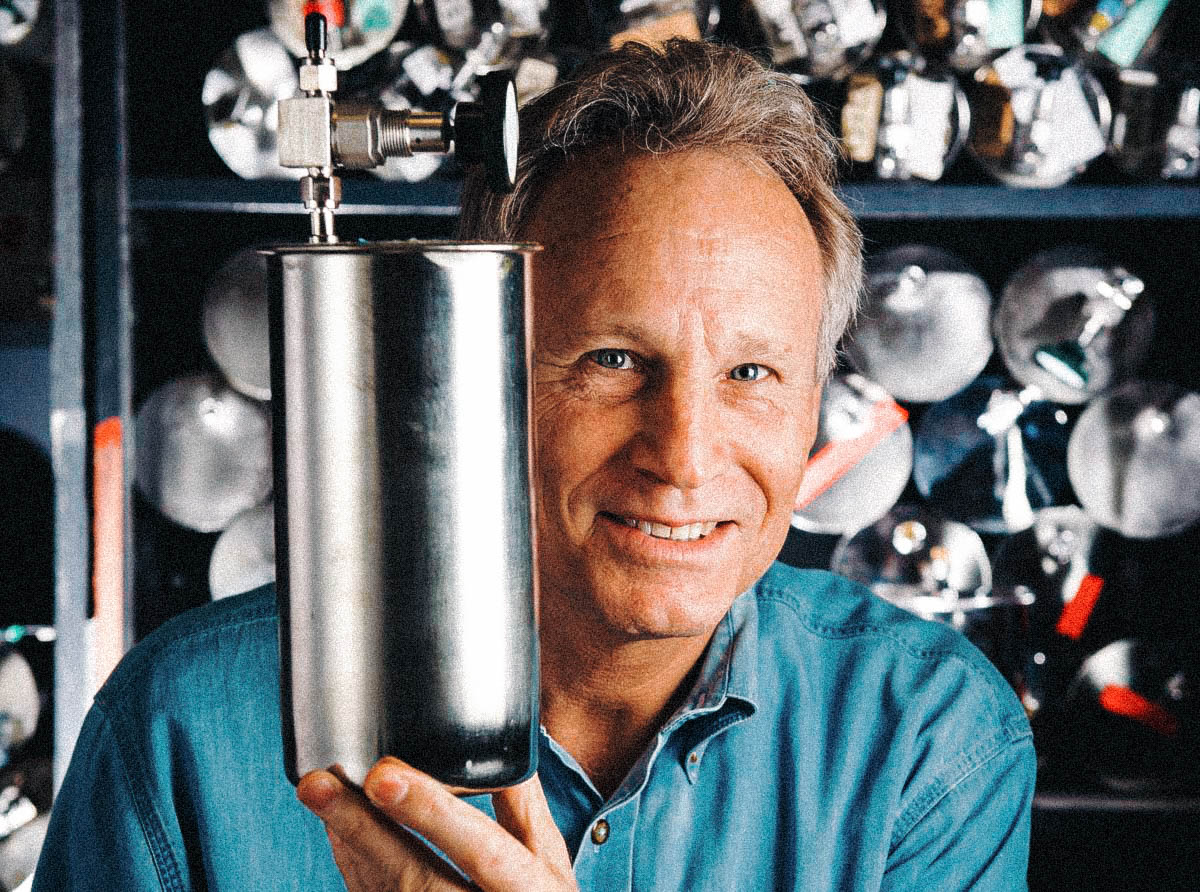Professor Don Blake wins Better World Award from Academic Senate

Professor Don Blake of UCI’s Rowland-Blake Group holds an air-capture canister, which he uses to capture samples of atmospheric gas.
On July 15, Professor Don Blake got a letter letting him know that the UC Irvine Academic Senate had awarded him their Better World Award, which recognizes the impact that a faculty member’s work has had, and continues to have, on society.
Blake was a graduate student under Sherry Rowland, who was the first chair of the UCI Department of Chemistry, and who won the 1995 Nobel Prize in Chemistry for his role in discovering what drove the formation of the ozone hole. Blake now runs the Rowland-Blake Group at UCI, and it was Rowland, Blake explained, who helped inspire him to become the scientist he is today.
“‘If you have an opportunity to,’” Blake recalled Rowland telling him. “‘Chose research projects that have the potential to impact society in a positive way.’” And that’s what Blake did. For one of his early projects, in the 1970s, Blake, along with then-West Point chemistry instructor Ed Mayer, started measuring concentrations of the greenhouse gas methane in the atmosphere. Today, it’s widely known that concentrations of methane are climbing thanks to human-driven emissions, but back when Blake and Mayer took their measurements, the paradigm of the day was that methane levels were stable. That, however, is not what the two discovered. In samples they retrieved from remote locations around the world, Blake and Mayer found that atmospheric methane concentrations were, in fact, rising, and they reported on this in 1982 in Proceedings of the National Academy of Sciences.
Blake also played a role in helping to improve the air quality in Mexico City, which, by 1991, was as bad as Los Angeles’ air was in the 1960s. Blake and Rowland sent an undergraduate student to take samples of Mexico City air, and the team found that part of what drove pollution in the city were leaks of fossil fuel gases into the air. Their findings, published in Science in 1995, helped move Mexico City to enact stricter air quality laws on the chemical composition of liquefied petroleum gas.
When Blake found out about the Better World Award, he immediately called his wife, and then he called Joan Rowland, Sherry Rowland’s widow, to tell her the news. He thought about Rowland, and about what Rowland told him about how he ought to pick his research projects. Compared to other awards, “this one by far was much more emotional than any of them,” Blake said. “I had tears in my eyes.”
Blake’s tears, though, were more than just tears for Rowland’ s words. Blake’s a Vietnam War draftee, and when he came back to the U.S. in 1973 after serving overseas, he remembers the cold reception people like himself received from other Americans upon their return. “There was no ‘welcome home’,” Blake said. Others in the military suggested he carry his civilian clothes in a bag; this was so he could change into them right after he got to a U.S. airport, so he wouldn’t attract any negative attention.
Blake carried a stigma with him into the post-war years, and part of the reason he felt moved to go into the work that he did to have a positive impact, he said, was so he could “work on something that I wasn’t embarrassed to talk to people about.” For Blake, had it not been for the disappointment he experienced upon coming home from the war, he’s not sure if he would be standing where he is today.
“It was not just the words of Sherry Rowland,” Blake said. “It was deeper.”
